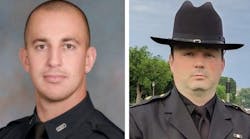As I rapidly approach nearly two decades of law enforcement service and reflect back, I can say there are many things that leave me shaking my head in awe about how cops think, act, and most importantly what they say or shouldn't. For example, I know of officers who think that because they are cops, they are best suited to make the transition from police work to security management. Having a deeper understanding of the security industry than most of my colleagues, I am not sure why they think that way. I think that being an experienced police officer, considering all its advantages, can actually be a severe hindrance when vying for that "cushy" security management job.
Several years ago, our patrol commander would often bombard us with what we termed "hate mails." This particular supervisor, residing on day shift and who rarely left his carpeted office, chose to communicate with all the officers of the uniform division almost exclusively by e-mail. At best, his e-mails were worded tersely--at worst, downright insulting. I vividly recall an instance where he sent me an e-mail after noticing that I had signed a report in blue ink instead of black ink. He told that from his perspective this was a continuing problem and that if I was to sign another report in blue ink that I should "don your riot helmet" and be prepared to have my head smashed in. Now, can you imagine this former police commander, who is now competing for a security management position in the private sector, speaking like this to non-police types? How long would his tenure be? Although this example is extreme, sad but true, it does highlight communication problems that I believe are systemic and unique, to law enforcement.
It's been said that there are two barriers to communication; physical and psychological. Police work encounters both on a daily basis, and due to tactical reasons, reinforces them. Riding in a patrol car for an eight hour tour means our main method of communication is via radio. The barrier is the cruiser itself, in addition to a secondary physical impediment, which is the distance between the officer and the dispatcher. Officers and dispatchers cannot see each other, sense one another's tension or lack of frustration, and they miss out on all the non-verbal cues that account for the vast majority of communication. If not speaking over the radio, officers communicate either by MDT chat, texting or through the "ping" of a Nextel. These other communicative methods share the same inherent problems as ineffective radio communication. Furthermore, radio codes and signals compound the problem. Simply saying, "in service" can be accomplished by stating, "10-8", "Signal 33", "Signal 23", and so on. Tactically, short numerical expressions have their designed purpose, but I would argue that repeated exposure to this method of communication actually diminishes, maybe even suppresses, a person's natural ability to communicate clearly. In short, it's a reinforced behavior that eventually becomes incorporated in different areas of our lives, not just police work. Ever wonder why most cops, although allegedly "people persons," are about as fun to talk to as your dentist as you sit in a chair waiting for your root canal? We are trained not to say much, and then blurt out a lot of abbreviated information in the form of a code that very few people understand.
Years later, you may find yourself sitting in front of normal looking human beings (i.e., no gun belts, body armor, or radio traffic chattering) wearing suits and speaking in long, descriptive sentences. These individuals are known as "human resource specialists" and they expect you to speak in a normal tone of voice while holding a conversation and explaining why you are the best person for the job. They do not understand "police speak" or "cop talk," and it does not impress them. The business world thrives on people who can communicate. Relearning the essential skill of speaking should become a priority as we near making that decision of whether or not we are ready to leave the police service. Here are suggestions that lead you toward becoming an impressive enunciator:
- Obtain your state law enforcement instructor's certificate, which requires you to go through a short course on how to be a teacher. You will be required to stand up in front of your colleagues and talk for some time while teaching them a new skill. You won't have to worry about them laughing at you, because they are just as bad.
- Take a Speech 101 class at your local community college, if you have the guts. You will look like a dinosaur sitting in the classroom, but if you are lucky you might recognize someone that you chased down the street at four o'clock in the morning, but didn't catch then.
- Volunteer for the "kiddy cop" assignment, D.A.R.E. You will go through an intensive teacher's mini-course and actually have to stand up in front of a non-police audience for a 40 minute block of instruction daily. The bright side is that if the class gets out of hand, you can probably take 'em without calling for backup.
- Join an organization such as Toastmasters, with other professionals who are interested in honing their public speaking skills. The bad news is you probably won't know anyone there the first time you go, but the good news is you can possibly out "cuss" them all.
- Reserve e-mails for what they are best used for: brief directives. Sensitive conversations, in-depth issues, or otherwise situations that require more than a few sentences should be done face-to-face. My rule of thumb is that "if it requires a paragraph, then a phone call is warranted."
You have spent a lifetime learning to communicate in dire situations that only cops can endure. The key is understanding that the rest of the society does not experience these things, and over time as the business world leans more toward effective communication, we step further away. Our worlds, in many ways, are diametrically opposed. Just imagine how valuable you could be to an organization if you developed speaking skills like a teacher, or someone else who talks professionally, coupled with your wide variety of emergency experiences? Consider this yet another stage of developing your marketability.


